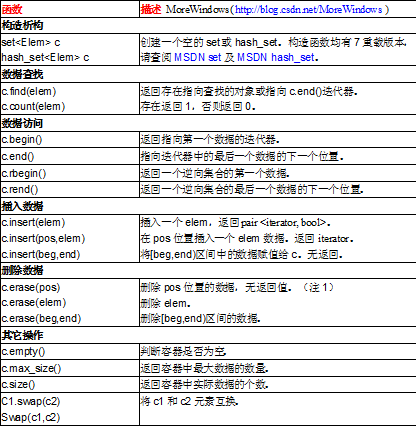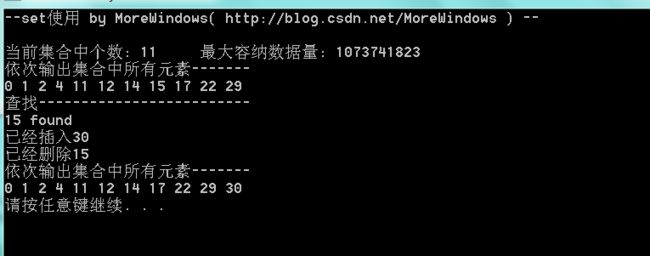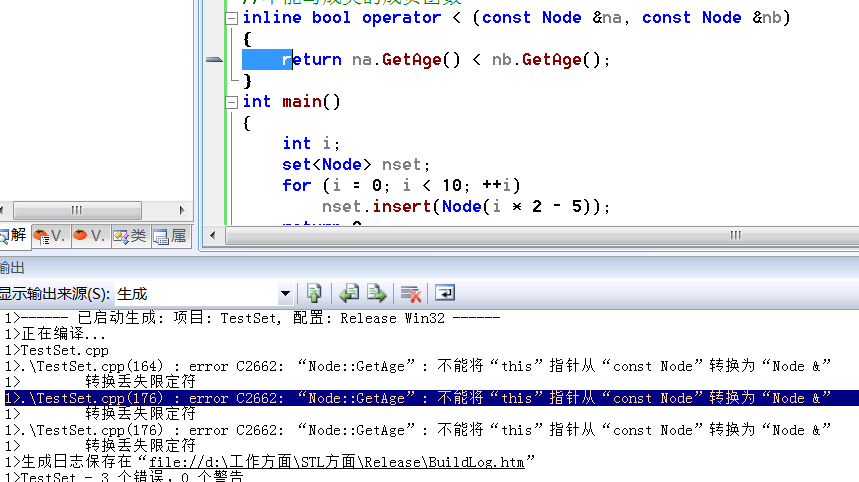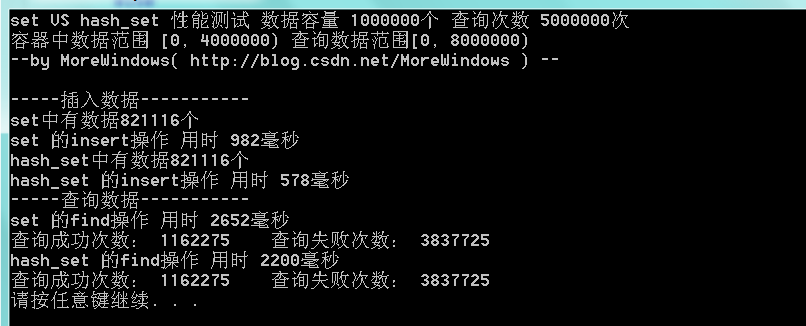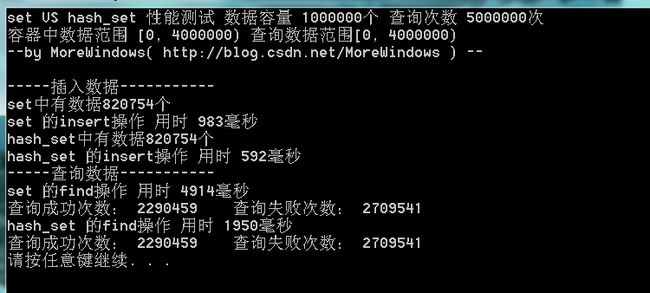STL系列之六 set与hash_set
STL系列之六 set与hash_set
set和hash_set是STL中比较重要的容器,有必要对其进行深入了解。在STL中,set是以红黑树(RB-tree)作为底层数据结构的,hash_set是以Hash table(哈希表)作为底层数据结构的。set可以在时间复杂度为O(logN)情况下插入、删除和查找数据。hash_set操作的时间复杂度则比较复杂,这取决于哈希函数和哈希表的负载情况。下面列出set和hash_set的常用函数:
set和hase_set的更多函数请查阅MSDN。
set的使用范例如下(hash_set类似):
// by MoreWindows( http://blog.csdn.net/MoreWindows )
#include <set>
#include <ctime>
#include <cstdio>
using namespace std;
int main()
{
printf("--set使用 by MoreWindows( http://blog.csdn.net/MoreWindows ) --\n\n");
const int MAXN = 15;
int a[MAXN];
int i;
srand(time(NULL));
for (i = 0; i < MAXN; ++i)
a[i] = rand() % (MAXN * 2);
set<int> iset;
set<int>::iterator pos;
//插入数据 insert()有三种重载
iset.insert(a, a + MAXN);
//当前集合中个数 最大容纳数据量
printf("当前集合中个数: %d 最大容纳数据量: %d\n", iset.size(), iset.max_size());
//依次输出
printf("依次输出集合中所有元素-------\n");
for (pos = iset.begin(); pos != iset.end(); ++pos)
printf("%d ", *pos);
putchar('\n');
//查找
int findNum = MAXN;
printf("查找 %d是否存在-----------------------\n", findNum);
pos = iset.find(findNum);
if (pos != iset.end())
printf("%d 存在\n", findNum);
else
printf("%d 不存在\n", findNum);
//在最后位置插入数据,如果给定的位置不正确,会重新找个正确的位置并返回该位置
pos = iset.insert(--iset.end(), MAXN * 2);
printf("已经插入%d\n", *pos);
//删除
iset.erase(MAXN);
printf("已经删除%d\n", MAXN);
//依次输出
printf("依次输出集合中所有元素-------\n");
for (pos = iset.begin(); pos != iset.end(); ++pos)
printf("%d ", *pos);
putchar('\n');
return 0;
}
运行结果如下:
下面试下在set中使用类(结构体也可以类似这样做)。这个类很简单,只有一个成员变量,及设置和获取这个成员变量的成员函数。
//在set中使用类要重载‘<’并实现拷贝构造函数
// by MoreWindows( http://blog.csdn.net/MoreWindows )
#include <set>
#include <ctime>
#include <cstdio>
using namespace std;
class Node
{
public:
Node(int nAge = 0)
{
m_nAge = nAge;
}
Node(const Node &na) //拷贝构造函数
{
m_nAge = na.GetAge();
}
int GetAge()
{
return m_nAge;
}
private:
int m_nAge;
};
//不能写成类的成员函数
inline bool operator < (const Node &na, const Node &nb)
{
return na.GetAge() < nb.GetAge();
}
int main()
{
int i;
set<Node> nset;
for (i = 0; i < MAXN; ++i)
nset.insert(Node(i));
return 0;
}
编译,直接报了3个错误!!1个在拷贝构造函数,2个在operator<()函数。如下图所示:
3个错误都是一样的:
error C2662: “Node::GetAge”: 不能将“this”指针从“const Node”转换为“Node &” 转换丢失限定符
这是怎么回事呀?分析下,拷贝构造函数与operator<()函数出错,错误都指向了GetAge()函数,有点古怪,比较下它们与GetAge()函数,可以发现最大的不同点在于这2个函数都用到了const而GetAge()函数没有使用const。难道是这个导致报错了吗?先给GetAge()函数加个const看看,如下:
int GetAge() const //增加这个const
{
returnm_nAge;
}
再编译,不报错了。再查下资料,原因如下——因为那2个函数都使用了const修饰的对象,但GetAge()没有加上const以保证它不修改对象,编译器认为这种写法是不安全的,所以就毫不犹豫报了个错误。
这种错误如果不亲身体会下,到笔试面试时很可能写了个错误程序而自己还处于一无所知中(死在这些小细节上最不值得)。另外,如果使用VC6.0则不会提示详细的错误信息——“转换丢失限定符”。
STL还为set提供了一些集合运算的函数,如交集set_intersection()、并集set_union()、差集set_difference()和对称差集set_symmetric_difference()。这些就不详细介绍了,有兴趣可以自己动手试一试。
下面开始对set和hash_set作个性能测试(Win7 +VS2008Release下)。
测试代码如下:
// by MoreWindows( http://blog.csdn.net/MoreWindows )
#include <set>
#include <hash_set>
#include <iostream>
#include <ctime>
#include <cstdio>
#include <cstdlib>
using namespace std;
using namespace stdext; //hash_set
// MAXN个数据 MAXQUERY次查询
const int MAXN = 10000, MAXQUERY = 5000000;
int a[MAXN], query[MAXQUERY];
void PrintfContainertElapseTime(char *pszContainerName, char *pszOperator, long lElapsetime)
{
printf("%s 的%s操作 用时 %d毫秒\n", pszContainerName, pszOperator, lElapsetime);
}
int main()
{
printf("set VS hash_set 性能测试 数据容量 %d个 查询次数 %d次\n", MAXN, MAXQUERY);
const int MAXNUM = MAXN * 4;
const int MAXQUERYNUM = MAXN * 4;
printf("容器中数据范围 [0, %d) 查询数据范围[0, %d)\n", MAXNUM, MAXQUERYNUM);
printf("--by MoreWindows( http://blog.csdn.net/MoreWindows ) --\n\n");
//随机生成在[0, MAXNUM)范围内的MAXN个数
int i;
srand(time(NULL));
for (i = 0; i < MAXN; ++i)
a[i] = (rand() * rand()) % MAXNUM;
//随机生成在[0, MAXQUERYNUM)范围内的MAXQUERY个数
srand(time(NULL));
for (i = 0; i < MAXQUERY; ++i)
query[i] = (rand() * rand()) % MAXQUERYNUM;
set<int> nset;
hash_set<int> nhashset;
clock_t clockBegin, clockEnd;
//insert
printf("-----插入数据-----------\n");
clockBegin = clock();
nset.insert(a, a + MAXN);
clockEnd = clock();
printf("set中有数据%d个\n", nset.size());
PrintfContainertElapseTime("set", "insert", clockEnd - clockBegin);
clockBegin = clock();
nhashset.insert(a, a + MAXN);
clockEnd = clock();
printf("hash_set中有数据%d个\n", nhashset.size());
PrintfContainertElapseTime("hase_set", "insert", clockEnd - clockBegin);
//find
printf("-----查询数据-----------\n");
int nFindSucceedCount, nFindFailedCount;
nFindSucceedCount = nFindFailedCount = 0;
clockBegin = clock();
for (i = 0; i < MAXQUERY; ++i)
if (nset.find(query[i]) != nset.end())
++nFindSucceedCount;
else
++nFindFailedCount;
clockEnd = clock();
PrintfContainertElapseTime("set", "find", clockEnd - clockBegin);
printf("查询成功次数: %d 查询失败次数: %d\n", nFindSucceedCount, nFindFailedCount);
nFindSucceedCount = nFindFailedCount = 0;
clockBegin = clock();
for (i = 0; i < MAXQUERY; ++i)
if (nhashset.find(query[i]) != nhashset.end())
++nFindSucceedCount;
else
++nFindFailedCount;
clockEnd = clock();
PrintfContainertElapseTime("hash_set", "find", clockEnd - clockBegin);
printf("查询成功次数: %d 查询失败次数: %d\n", nFindSucceedCount, nFindFailedCount);
return 0;
}
在数据容量100万,查询次数500万时,程序运行结果如下:
由于查询的失败次数太多,这次将查询范围变小使用再测试下:
由于结点过多,80多万个结点,set的红黑树树高约为19(2^19=524288,2^20=1048576),查询起来还是比较费时的。hash_set在时间性能上比set要好一些,并且如果查询成功的几率比较大的话,hash_set会有更好的表现。想知道为什么hash_set会有优良的性能表现,请看继集——《STL系列之九 探索hash_set》。
注1. MSDN上讲set的erase()是有返回值的,但在VS2008中查看set的源代码,erase()函数的三个重载版本中,有二个返回值都为void即无返回值,另一个返回size_type。 可以通过http://msdn.microsoft.com/zh-cn/library/8h4a3515(v=VS.90).aspx查看MSDN上对set的erase()说明。
转载请标明出处,原文地址:http://blog.csdn.net/morewindows/article/details/7029587
